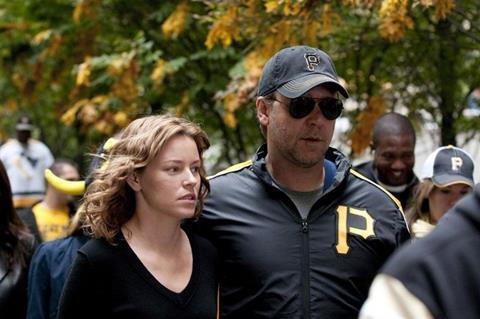Dir: Paul Haggis. US. 2010. 134mins

Two acts of muddled character study and a final act that’s a taut, extended cat-and-mouse chase: This is what awaits viewers in The Next Three Days, an intriguing but very frustrating drama from Oscar-winner Paul Haggis. Playing an ordinary man obsessed with springing his wrongly convicted wife out of jail, Russell Crowe lends gravitas to a wobbly premise, but even he can’t overcome the film’s heavy-handed execution.
Playing an everyman rather than a hero like he did in Gladiator or Robin Hood, Crowe sheds some of his natural charisma for an empathetic, tortured portrayal of a husband at the end of his tether.
Opening domestically November 19, The Next Three Days may face commercial roadblocks because, despite its prison-break premise, it’s not a high-octane action-thriller. Indeed, its muted, introspective tone could prove difficult for mainstream audiences to embrace, despite Crowe’s marquee value.
Literature professor John Brennan (Crowe) has had to raise his young son (Ty Simpkins) on his own ever since his wife Lara (Elizabeth Banks) was incarcerated three years ago for a murder she didn’t commit. With legal options exhausted, John realises that he must devise a plan to break her out of jail, a decision that puts him into contact with dangerous underworld figures.
Based on the French thriller Pour Elle, The Next Three Days finds writer-director Paul Haggis ditching the political and social consciousness of his previous features (Crash, In The Valley Of Elah) for a sombre examination of obsession that eventually morphs into a suspenseful chase picture.
Before that ending, though, The Next Three Days struggles to justify its ambitious and morally ambiguous setup, presenting the audience with a regular guy who normally would not associate with hoodlums or commit petty crimes but who must if he is to rescue his wife. On one level, Haggis and Crowe want John’s journey to seem unbelievable so as to illustrate the lengths he’ll go to reunite with Lara, but the intricacies of the man’s plan never feel consistent with the mindset (or skill set) of a simple college teacher.
And while Haggis avoids the sermonising of his previous efforts, he continues his irksome habit of leaning on easy storytelling gimmicks — in particular, the use of strained dramatic coincidences such as the fact that John just so happens to be teaching his students Don Quixote, a story about a man who, like John, pursues a futile dream at the risk of his sanity and safety. Ironically, for all the film’s ponderous study of the human soul, it’s most engaging at its most heist-movie conventional when the finale pits John against the police who are trying to track him down.
Crowe almost makes this all work, imbuing John with a no-nonsense urgency. Playing an everyman rather than a hero like he did in Gladiator or Robin Hood, Crowe sheds some of his natural charisma for an empathetic, tortured portrayal of a husband at the end of his tether. Because the film so focuses on John’s emotional journey, the other actors are mostly periphery, although Lennie James is quite effective as a smart cop determined to stop John.
Production company: Hwy 61 Films, Lionsgate
Domestic distribution: Lionsgate, www.lionsgate.com
Producers: Michael Nozik, Paul Haggis, Olivier Delbosc, Marc Missonnier
Executive producers: Agnes Mentre, Anthony Katagas
Screenplay: Paul Haggis (based on the film Pour Elle, a film by Fred Cavaye and screenplay by Fred Cavaye and Guillaume Lemans)
Cinematography: Stephane Fontaine
Production designer: Laurence Bennett
Editor: Jo Francis
Music: Danny Elfman
Website: www.thenextthreedaysmovie.com
Main cast: Russell Crowe, Elizabeth Banks, Brian Dennehy, Lennie James, Olivia Wilde, Ty Simpkins, Helen Carey, Liam Neeson





















